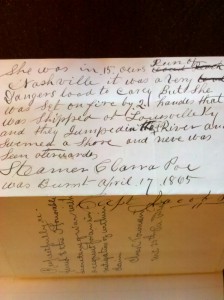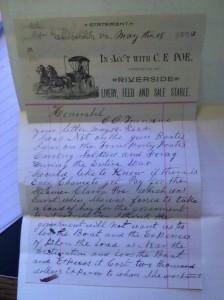The Taste of Ashes
The str Clara Poe met a fiery end on 17 Apr 1865 at Eddyville on the Cumberland River while transporting supplies and barges of hay to Nashville. That date was two days after President Abraham Lincoln was assasinated and eight days after Gen Lee had surrendered. The owners of the str Clara Poe requested indemnity from the US Army Quartermaster. Correspondence between the principal owners and the US government is available at the National Archives in the military “Vessel File”. In an undated signed letter with the request, Jacob Poe explained the conditions at the time of the “calamitous event”.
“She was in 15 ours run of Nashville it was a very
dangers load to carry but she
was set on fire by 2 hands that
was shipped at Louisville, Ky
and they jumped in the river and swam a shore and neve was
seen afterwards
Steamer Clara Poe was burnt April 17, 1865
Written in the margin of this note was a request to the Dept of War to conduct and investigation signed Chas C Townsend.
Jacob Poe responded to some non-archived correspondence by Chas C Townsend dated 16 May 1890 with a letter written on his son’s livery letterhead dated “May the 18 1890.
Honorable
C.C. Townsend
your letter may 16 reed
I was not on the gun boats
I was on the transporty boats
carring soldiers and forage
during the entire war
would like to know if there is
eney chance to get pay for the
steamer Clara Poe which was
burnt when she was forced to take
a load of hay for the government
to Nashville for I think the
government will not want us to
loos the boat and the expenses
of taken the load as near the
destination and loos the boat
and expenses it cost two thousand
dollars expenses to whare she was burnt
The next correspondence was dated 10 Jun 1890, or maybe 16 Jun 1890 — some twenty-five years and a few days after the “calamitous event”. Principal owner and first master of the Clara Poe, Thomas W Poe had been dead nine years; George W Ebert had been gone eleven years; George Poe six years; Andrew Poe 3 years; and the status of Jonathan Kinsey is unknown. Quite possibly, Jacob Poe was the only living owner of the str Clara Poe. And Jacob Poe died less than a year later on 13 Mar 1891. The battle for compensation was waged through six presidencies, Andrew Johnson to Grover Cleveland, without success.
The correspondence of 10 Jun 1890 was addressed to Jacob Poe and signed by Chas C Townsend, the Deputy Quartermaster General. After a paragraph of introduction Chas C Townsend stated “you are respectfully informed that this vessel was not chartered by the government at the time — having been discharged from such service on January 22, 1865. She is therefore not found on any government report subsequent to that date and although she may have been engaged as a common carrier transporting public property the vessel cannot be considered to have been in charge of the US government at the time of her destruction.”
With that pronouncement, the Clara Poe was a complete loss to her owners including her expenses on her fatal last trip. Chas C Townsend, Deputy US Army Quartermaster, had no record of charter so he rightly, or wrongly, refused to compensate the owners for their loss. The Gibsons’s dictionary does not note the destruction of the Clara Poe which indicates that no charter agreement had been signed, recorded, and archived. In Way’s Dictionary, Capt Way states “she was still in US service when she burned near Eddyville on the Cumberland River” although Capt Way’s words included no citation.
Natural connections of the actions of the str Clara Poe sketch a portrait of a boat that had worked the entire war on the western rivers. Contrary to Chas C Townsend’s penchant for accounting detail, the probability that Thomas W Poe was doing government business was extremely high. My take. The government records were misfiled, misplaced, lost, or ignored. Or Thomas W Poe was coerced, or compelled by a sense of duty, to transport the supplies without proper authorization. A precedent had been set for action without compensation when Capt Thomas W Poe was cited by the mayor Pittsburgh for volunteering to go to the Cumberland River to relieve sick and wounded soldiers. See the page named A Civil War Letter. In any case, the Poe family boat was a loss of 12 – 20 thousand dollars. Today, that sum would be approximately $150-260 thousand.
The Poes were Union men. Their beliefs were deeply felt. Their war efforts ended with the taste of ashes. Think about that for a few moments.
Copyright © 2010 Francis W Nash
All Rights Reserved

